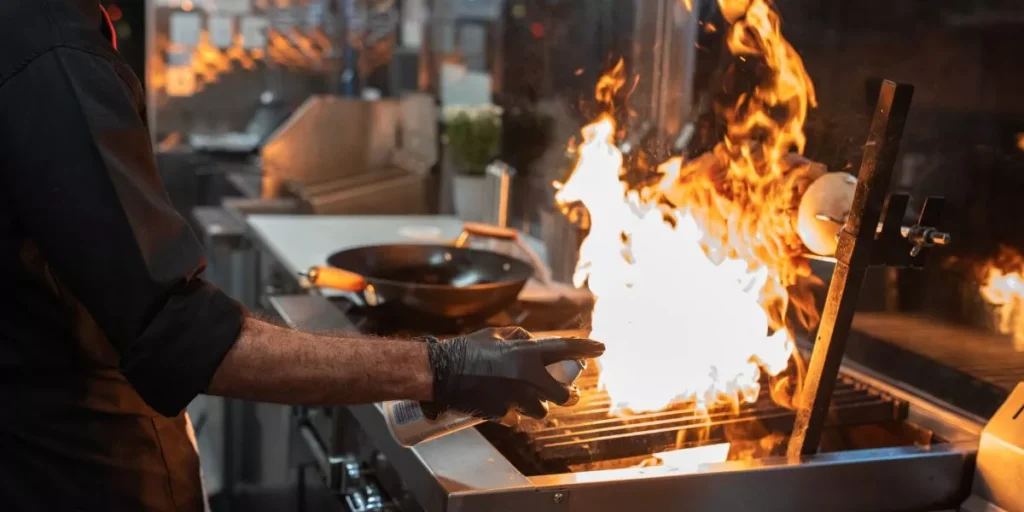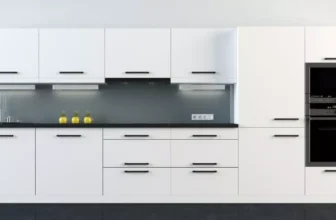
To ensure fire safety in your cooking space, it’s vital to implement preventive measures that can make a significant impact on the safety of your kitchen environment. By following a few essential steps, you can greatly reduce the risk of potential fire hazards and create a safer cooking space for you and your loved ones. Let’s begin by exploring the first crucial aspect of maintaining a secure cooking area.
Kitchen Appliance Maintenance
To ensure optimal performance and safety in your kitchen, regularly maintain your kitchen appliances. Keeping your appliances in top condition not only improves efficiency but also reduces the risk of malfunctions that could lead to fires. Start by checking the cords and plugs of your appliances for any signs of wear or damage. Replace any frayed cords immediately to prevent electrical hazards.
Next, clean your appliances regularly to prevent the buildup of grease and food particles that can ignite and cause fires. Follow the manufacturer’s instructions for cleaning each appliance, paying special attention to areas prone to residue accumulation. For example, make sure to clean the filters of your range hood to prevent grease buildup and maintain proper ventilation.
Additionally, schedule professional maintenance for your larger appliances, such as your oven and refrigerator, to ensure they’re functioning safely and efficiently. Regular maintenance can help identify potential issues before they escalate into serious problems. By taking these simple steps to maintain your kitchen appliances, you can minimize the risk of fires and ensure a safe cooking environment.
Proper Ventilation Practices
Regularly maintaining your kitchen appliances not only ensures their optimal performance but also plays a vital role in preventing fires; now let’s focus on the importance of proper ventilation practices.
Adequate ventilation in your cooking space is crucial for dissipating heat, steam, and airborne particles produced during cooking. Without proper ventilation, these elements can accumulate, creating a potential fire hazard. To ensure effective ventilation, make sure your kitchen hood or exhaust fan is clean and in good working condition. Regularly check and clean the filters to prevent grease buildup, which can ignite and cause a fire.
Additionally, ensure that the exhaust fan or hood is vented to the outside of your home to direct smoke and fumes outdoors. Maintaining proper ventilation not only reduces the risk of fires but also helps maintain air quality in your kitchen, creating a safe and comfortable cooking environment.
Safe Cooking Habits
Wondering how you can cook safely in your kitchen space to prevent potential fire hazards? Follow these safe cooking habits to reduce the risk of fires.
Firstly, never leave your cooking unattended. Whether you’re frying, boiling, or baking, always stay in the kitchen while food is cooking on the stove or in the oven. It only takes a moment for a fire to start, so being present can help you react quickly.
Additionally, keep flammable items away from the stovetop. This includes kitchen towels, oven mitts, wooden utensils, and paper towels. These items can easily catch fire if they come into contact with a hot burner. Also, be cautious with loose clothing that could dangle over the flames.
Furthermore, regularly clean your cooking appliances to prevent grease buildup. Grease is highly flammable and can ignite with high heat, causing a dangerous fire. By keeping your appliances clean, you reduce the risk of grease fires breaking out in your kitchen.
Emergency Preparedness
In case of an emergency, always have a well-thought-out escape plan prepared for your cooking space. When it comes to emergency preparedness in your kitchen, having a clear plan can make all the difference.
Firstly, ensure all family members or housemates are aware of the escape routes and where to meet outside. Practice this plan regularly, especially if you have young children or elderly family members in the household.
Additionally, it’s crucial to have functioning smoke alarms installed near the kitchen area and throughout your home. These alarms can provide early detection of a fire, giving you more time to evacuate safely.
Keep a fire extinguisher in an easily accessible location in the kitchen and know how to use it correctly. Lastly, having emergency contact numbers, like the fire department, easily visible can save precious seconds in a crisis.
Kitchen Appliances














